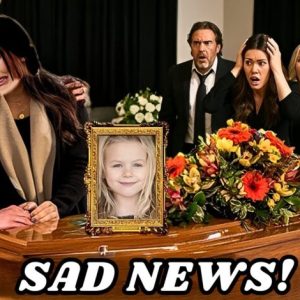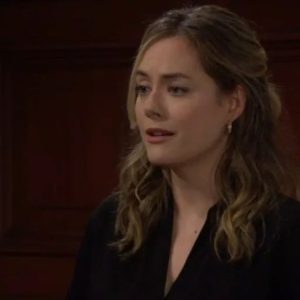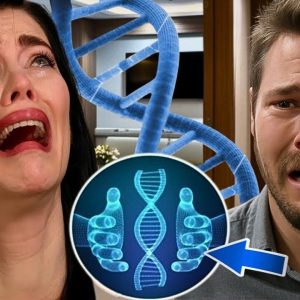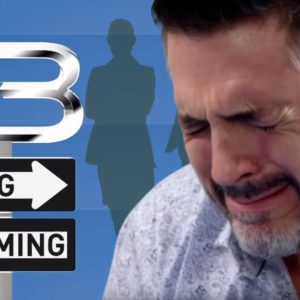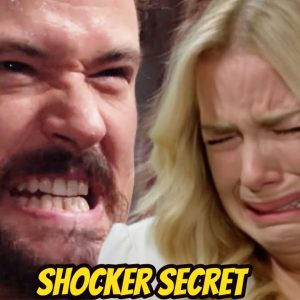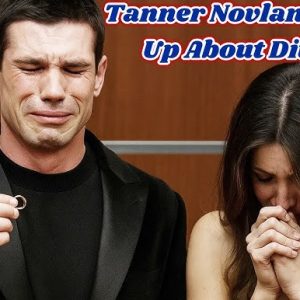Liam Spencer’s return from brain surgery was nothing short of miraculous. Doctors called it a success; his recovery timeline broke all expectations. Within weeks, he was up and walking. Within a month, he was back at Spencer Publications, barking orders and reclaiming control with a fire that felt… off. Something wasn’t right. His energy had shifted, as if the man who emerged from that operating room wasn’t quite the same one who’d gone in.
At first, Hope Logan tried to rationalize the changes. Maybe it was the trauma, the physical stress, the painkillers. But as the days wore on, Liam’s behavior veered from merely uncharacteristic to deeply disturbing. He was impulsive, diving headfirst into reckless decisions with no regard for consequence. He bought a vintage motorcycle on a whim and took off late at night without telling anyone. He spoke with a biting edge, especially to those closest to him. One minute he was charming and present, the next cold and withdrawn. It was the way he looked at her sometimes, like she was a stranger. And then there were the children. Beth, their daughter, adored her father. So did Kelly. But even they began to tread lightly around him.
A Dark Shift: The Truth About Liam’s Recovery
Liam’s temper flared without warning. A spilled drink, a toy left in the hallway, an innocent question—any of these could ignite him. He would shout, then claim he didn’t remember doing it. Hope began to fear being alone with him, not for her own safety, but for the emotional safety of their kids.
It was Bridget Forrester who first raised the medical red flag. After a family dinner at the Forrester estate, where Liam snapped at Thomas with unnerving aggression, Bridget pulled Hope aside and asked if she’d noticed any cognitive shifts. “I’ve seen post-op patients change,” she said cautiously, “especially if there was any kind of neural trauma or if they were exposed to certain compounds.” That was the first time Hope heard the name Grace Buckingham mentioned in this context. Grace, a doctor with a history of unorthodox methods and hidden agendas, had inserted herself into Liam’s recovery process early on. She’d consulted off the record, Hope had been told. Back then, it hadn’t seemed alarming. Grace always carried an air of authority and confidence.
But now, with Liam spiraling and Bridget suggesting neurochemical imbalances, Hope began to put the pieces together. It was more than just surgery aftermath. Something else had altered Liam. Hope confronted Grace privately. “What exactly were you giving him?” Grace didn’t answer directly. She smiled, played coy, and implied she’d merely tried to support Liam’s healing process in a more “advanced” way. When Hope pressed, Grace finally said, “We needed him to show certain symptoms for the treatment to be approved.” Hope froze. “What symptoms?” Grace’s eyes flicked away. “Neurological ones.”
The truth began to form like a storm cloud. Grace had administered an unapproved pharmaceutical regimen to Liam, likely a combination of cognitive stimulants, emotional suppressants, and neuromodulators. The goal: to simulate post-surgical neurological distress that would justify a longer-term drug trial she was quietly funding. Liam had been her subject, her lab rat.
The Spiral Deepens: A Family Divided
The next step was clear to Hope: she turned to Bridget again, asking for a full neurological assessment. Bridget agreed, but Liam refused. He stormed out of the house when Hope brought it up. “You think I’m crazy?” he shouted. “You think I’m broken? You want me drugged up and locked away?” Hope tried to calm him, to explain that no one was accusing him of anything. But Liam couldn’t hear it. His pride, his paranoia, the cocktail of substances still likely influencing his brain—everything was pushing him further from reality. He began accusing Hope of betrayal. He said she was conspiring with the Forresters, that she wanted to take the kids and destroy his name.
What began as concern turned into a crisis. Liam’s behavior escalated until one night he completely lost control. It was during a quiet evening at home. Beth had fallen off a chair and cried out. It wasn’t serious, just a scraped knee, but Liam erupted. He shouted at Beth for being careless, then turned his anger on Hope for letting it happen. His voice thundered through the house. Kelly, visiting for the night, ran to her room and locked the door. Hope stood frozen, Beth sobbing in her arms as the man she once loved raged before her like a stranger. The next morning, she packed a bag and took the children to Brooke’s house.
That incident changed everything. Suddenly, the entire family was pulled into the vortex. Ridge demanded answers. Steffy threatened legal action if Liam came near Kelly again. Brooke, typically a voice of restraint, told Hope point blank, “You need to get him evaluated or you need to walk away for good.” But it wasn’t that simple. Hope still loved Liam, buried deep beneath the fear and confusion. She saw flashes of the man he used to be, and more than that, she knew the truth about what Grace had done. And that Grace had the power to destroy everything if she were exposed. If they brought Grace’s illegal actions to light, it would vindicate Liam. It might even save him. But it would also trigger a wave of consequences: lawsuits, medical investigations, public scandal. Their children would be at the center of it all.
Steffy posed the question that no one else dared say out loud: “Do we save Liam by blowing up everything else, or do we bury it to protect the girls?” The family was split. Ridge and Steffy wanted full accountability. Taylor surprisingly suggested a middle ground, privately confronting Grace and forcing her to walk away in exchange for silence. Brooke pushed for public exposure. Bridget warned that delaying medical help could permanently damage Liam’s brain, and Hope was trapped. She began documenting everything: his behavior, his outbursts, the medication records she found hidden in Grace’s files. She needed evidence. If she had to go to court to protect Beth, she wanted the truth on her side.
Meanwhile, Liam spiraled deeper. He became obsessed with controlling the narrative. He accused Hope of gaslighting him. He showed up unannounced at her mother’s house. He began threatening to take Beth away if Hope didn’t “fix this.” Eventually, Bill Spencer entered the picture. Liam’s father had been silent for much of the ordeal, distracted by business and his own personal battles. But when he heard what happened with Beth, he snapped to attention. Bill confronted his son and saw immediately what others had feared: Liam was unstable, volatile, a danger to himself and his family.
The Unthinkable Tragedy: Kelly’s Death
Bill didn’t hesitate. He dragged Liam to a private clinic and paid for an emergency intervention. The doctors ran tests. The results were chilling. Liam’s brain chemistry had been massively altered. Grace’s experimental cocktail had fried key emotional receptors. Without intensive detox and rehabilitation, the damage could become permanent. Hope now had a choice: go public with the findings and press charges against Grace, or remain silent, keep her family intact, and hope Liam could recover quietly. She chose the former. With Bridget’s help, she compiled a dossier of medical evidence. Bill used his media empire to release a controlled story: “Doctor Under Investigation for Experimental Drug Use in High-Profile Case.” Grace fled the state before she could be subpoenaed. A warrant was issued. The fallout was massive, but it was not without cost.
Liam was admitted into long-term neurocognitive rehab. He would not be returning home for months, perhaps longer. The children were confused, frightened. Hope tried to explain, but how do you tell your daughter her father “lost himself”? The scandal rocked the Forresters and the Logans alike. Spencer Publications took a hit. Trust within the family was shaken, but in the end, Hope stood firm. She protected Beth and Kelly. She made the hard call. And maybe, just maybe, she saved Liam’s life. Recovery wouldn’t be simple. There were no guarantees. But for the first time in months, Hope allowed herself to breathe. Because the worst had happened, and they had survived it.
Liam’s progress at the clinic had been erratic. Some days he was lucid, articulate, almost like his old self. Other days, the fog returned. He would forget where he was, become paranoid, or lash out unexpectedly. Doctors warned Hope and Bill that the damage caused by Grace’s unauthorized drug regimen was more severe than initially thought. His emotional regulation remained unstable. His short-term memory flickered in and out like a faulty light.
But Liam was determined to prove he could be trusted again. He insisted on spending time with his children. “I need to feel normal,” he said. “I need to show them I’m still their father.” Against her better judgment, and under pressure from Bill, who believed that supervised visits were a sign of progress, Steffy allowed Liam to take Kelly for a short afternoon outing. “Just the beach,” she told him firmly. “No distractions, no risks. You stay with her every second. Do you understand?” Liam nodded. His eyes were steady. “I understand. I won’t let anything happen.” That was the last time Steffy saw her daughter alive.
No one knows exactly how it happened. The official report would later say Kelly wandered too far down the shoreline while Liam sat on a bench, distracted. Some said he had fallen asleep. Others whispered he had a brief psychotic break. The tide had risen. The current pulled fast. When lifeguards found Kelly, it was too late.
The hospital called Steffy just after sunset. The voice on the phone was calm, clinical. “Miss Forrester, we’re so sorry. Your daughter drowned this afternoon. She was found unresponsive.” At first, Steffy didn’t move. The words didn’t make sense. Drowned. Kelly? Her Kelly? When reality sank in, her scream shook the walls. Ridge ran to her room. Taylor dropped the phone in her hand. For hours, Steffy sat curled on the floor, clutching a blanket Kelly had slept with the night before. Her soul cracked, her heart collapsed in on itself.
Meanwhile, at the hospital, Liam sat alone in the hallway, drenched in saltwater, shoes gone, clothes torn, his hands trembled in his lap. He stared forward, blank. Hope arrived with Bill. Both of them silent with dread. “Where’s Kelly?” Hope asked. Liam turned to her slowly. His voice was flat. “She was right there. I told her not to go too far. I told her.” Hope felt her stomach twist. “What do you mean ‘not too far’?” “I sat down. I needed a minute. Just one minute. She said she wanted to collect shells.” Hope’s face went pale. “She was right there,” Liam whispered. “And then she wasn’t.” Hope looked at the doctor behind the glass wall. The nurse slowly shook her head.
The Devastating Fallout
The aftermath was catastrophic. Steffy refused to see Liam. Not at the hospital. Not at the memorial. Not even weeks later when Liam attempted to write her a letter. Her grief was volcanic, suffocating. She blamed herself, then blamed Liam, then blamed the universe. But mostly she couldn’t understand how the man she once trusted with her daughter’s life could let this happen. Ridge demanded legal action. Taylor wanted to seek emergency psychiatric commitment. Bill offered to pay off the press to bury the story before it reached the tabloids. Hope sat in the middle, trying to hold the entire broken family together while grieving a child who wasn’t hers but had always been in her heart.
And Liam. Liam disappeared, not physically. He remained in a hospital ward under 24-hour observation, but his mind retreated into a murky fog of denial and confusion. At times, he asked where Kelly was. He spoke of her in the present tense. “We were going to build a sandcastle tomorrow,” he said to a nurse. One night, Hope tried to reach him. She sat by his bed. “Liam, do you remember what happened at the beach?” He looked at her, eyes clouded. “I think… I think someone took her. I turned around and she was gone.” “No one took her,” Hope said softly. “The tide did.” He blinked. “No, that doesn’t make sense. I would never let that happen.” “You did,” she said. “But it wasn’t your fault. Not completely. Grace altered your mind. You weren’t well.” Liam began to cry softly, then violently. It was the first time he showed any emotion since Kelly’s death.
Days passed, then weeks. The funeral came and went. The press got hold of the story despite Bill’s best efforts. The headlines were brutal: “Spencer Heir Loses Child in Tragic Beach Accident.” Online commenters were cruel. Questions were asked: Should Liam be prosecuted? Was this criminal negligence? Why was a man with known neurological issues allowed to care for a child?
Steffy, meanwhile, began to fade. She stopped returning calls. She left the Forrester mansion and moved to a private residence away from the press. The family, the memories, even her mother couldn’t reach her. Her grief became isolation. Some feared she wouldn’t survive it.
Then one morning, Steffy reappeared. She walked into Spencer Publications unannounced. She went straight to Bill’s office. “I want to file a wrongful death suit,” she said. “Against Grace Buckingham, and I want to be the one to read the charges in court.” Bill didn’t try to stop her.
The trial became the scandal of the year. Grace was found and extradited. Her courtroom defense was weak. Too weak to overcome the evidence. Hope, Bridget, and even Thomas had gathered. Photos, lab reports, drug formulations, witness statements. Liam testified, though his testimony was broken and riddled with memory gaps. “She changed me,” he said in court. “I thought I was fine. I thought I was myself, but I wasn’t.” Grace was sentenced to 15 years for criminal medical malpractice and negligent homicide.
But there was no justice. Not really. No prison term could bring back Kelly. Steffy stood outside the courthouse steps surrounded by flashing cameras. When asked for a comment, she said, “Only this. My daughter is gone. And so is the man I trusted. What remains is grief. That’s all there is now.” Hope in the shadows held Beth close and wept.
And Liam. Liam remained in treatment, slowly recovering memory, fragment by painful fragment. Sometimes he remembered the beach. Sometimes he saw Kelly in dreams. Sometimes he awoke screaming. One day, many months later, during a therapy session, Liam asked his psychiatrist a single question: “Did I kill my daughter?” There was a pause. The doctor answered gently. “You didn’t mean to, but yes, you were responsible.” Liam nodded. His face was calm. For the first time in a long time, he didn’t cry. He just stared out the window, the ocean in the distance, waves lapping the shore.
